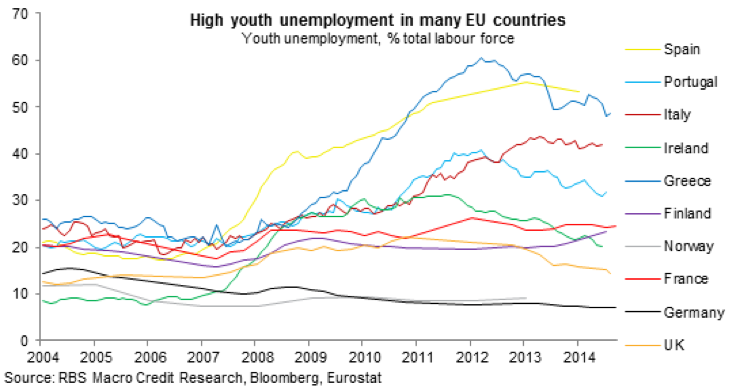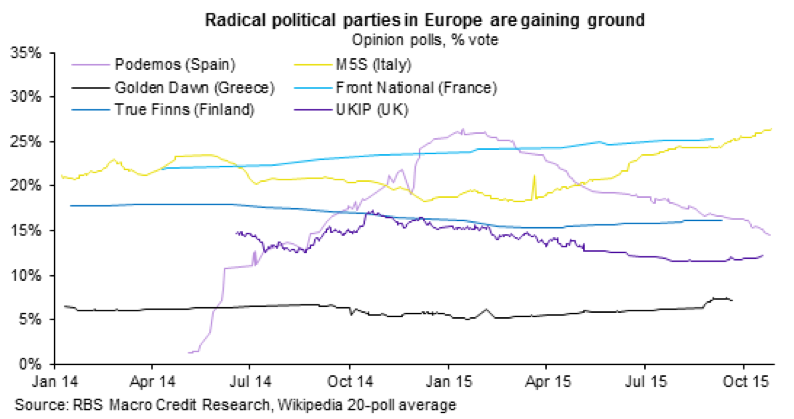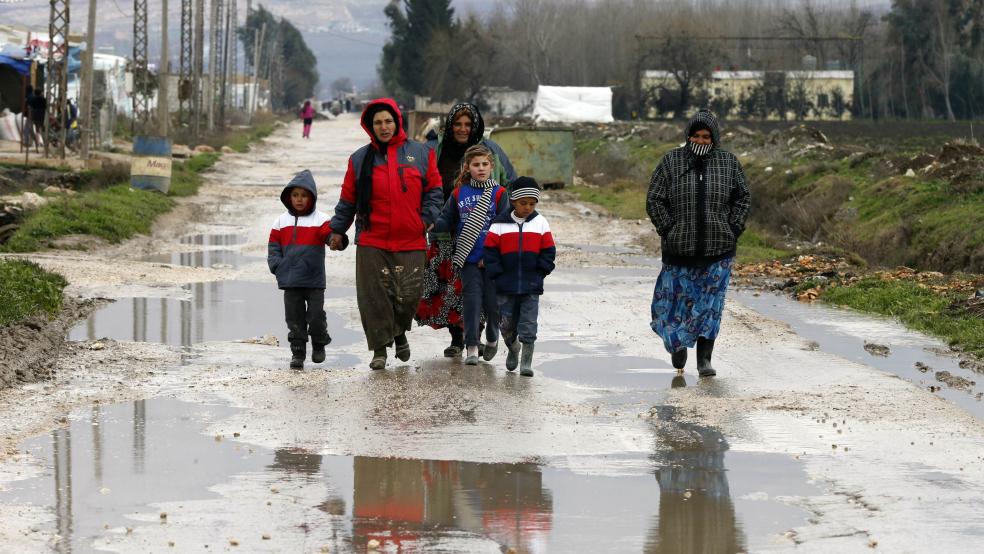Should we keep 10,000 Syrian refugees from coming into the United States? It's all anyone can seem to talk about in the wake of the Paris terror attacks.
Which is odd. I figured the political discussion would focus on how hard to bomb Islamic State terrorists, how we're going to reconstitute a Syrian state or even how we can justify the slow-burn policy bungle that brought us here. Instead, everyone is focusing on the Statue of Liberty, the veracity of vetting interviews and the proper balance of compassion vs. security.
Europe has been the front line for all of this, with over half a million migrants from the Middle East and Africa flowing in so far this year, according to the International Rescue Committee. Since 2012 the number totals 1.9 million. And, in the realm of unexpected consequences, Europe’s immigration issues could very well threaten the return of the EU debt crisis and undermine the Eurozone itself.
Related: Why Paris Was the Target of the ISIS Massacre
The problem, according to Alberto Gallo, head of macro credit research at RBS, is that the influx of migrants has resulted in an increase in political risk and radicalization — helping anti-euro parties in France, Italy and Finland gain in the polls.
Remember, Europe's debt crisis has waxed and waned in response to electoral developments (the rise of the leftist Syriza party to power in Athens, for instance) and the ability of the European Central Bank to soothe the situation with bond-buying stimulus (which has suppressed the bond yields of too-big-to-fail Spain and Italy).

A quiet has followed, bolstering market sentiment, lifting stock and bond prices and helping to support a halting, fragile economic recovery. But structural indebtedness and too-high youth unemployment remain persistent problems. Bringing in hundreds of thousands of poor, low-skilled, welfare-dependent immigrants and refugees is only set to exacerbate the problem.
Estimates from the German government put the cost-per-refugee to its budget at around $13,000 a year. Wages for low-skill jobs will likely come under pressure.

Research from the Centre for Economic Policy Research and its policy portal suggest a link exists between poor economic growth, budget austerity and social unrest. As these flames are fanned, it's not hard to foresee other populist, nationalistic governments rejecting the European Union's debt/deficit rules — bringing back fears of euro exits and debt defaults and rattling complacent financial markets.

French authorities have cited budget cuts to security spending as a contributing factor to the Paris attacks and the resulting murder of 130 innocent people. France has moved to ditch the Eurozone's Stability Pact, freeing itself for more deficit spending after the European Union granted the country three deferrals from the requirement to bring its deficit below 3 percent of GDP.
Related: Here’s Why Oil Prices Are Holding Steady, Despite the ISIS Attacks
Europe's youth unemployment rate is already in double digits in most countries. The wealth gap is cavernous, with people below 35 years of age owning only 5 percent of all financial assets, according to European Central Bank data.
This has likely contributed, according to Gallo's research, to the conversion of European citizens, including many from France, into ISIS terrorists. In his words, "a lack of opportunity and loss of hope in the existing economic and social system can turn people against it."
Gallo’s takeaway: A financial market tranquility and "equilibrium based on [bond-buying stimulus] and monetary policy alone is inherently fragile, with political risk being the breaking point."
Tremors can already be felt.
Greece's September elections bolstered the hard right Golden Dawn party, which won 7 percent of the vote to make it the third most popular party and the fastest growing of the top three. Its party leader campaigned against further budget austerity and for Greece to protect its borders against immigrants using land mines.
Related: The Fight Against ISIS Has New Price Tag — $5 Billion and Counting
France's Marine Le Pen, leader of the right-wing National Front, the third-largest party, is generating buzz heading into regional elections in three weeks and lifting her prospects as a presidential candidate in 2017 with an anti-immigrant, anti-Islamist message. Her party has climbed to upwards of 30 percent in the polls this year from 17 percent in 2012 while French President François Hollande's approval rating was recently down in the teens.
In Germany, the anti-immigrant Pegida group organized a march of 10,000 protesters last Monday. In Hungary, Prime Minister Viktor Orban told parliament that "terrorists have exploited mass migration."
The influx of migrants into Europe — with all the economic, social, security and political ramifications — could once more threaten the viability of the Eurozone as a common currency union. Only this time, because of the growing scarcity of Eurozone government debt, the European Central Bank may not be able to by enough bonds to calm the situation.
The endgame? According to Gallo, the ECB could be forced to buy other financial assets, including corporate bonds and even European stocks.






